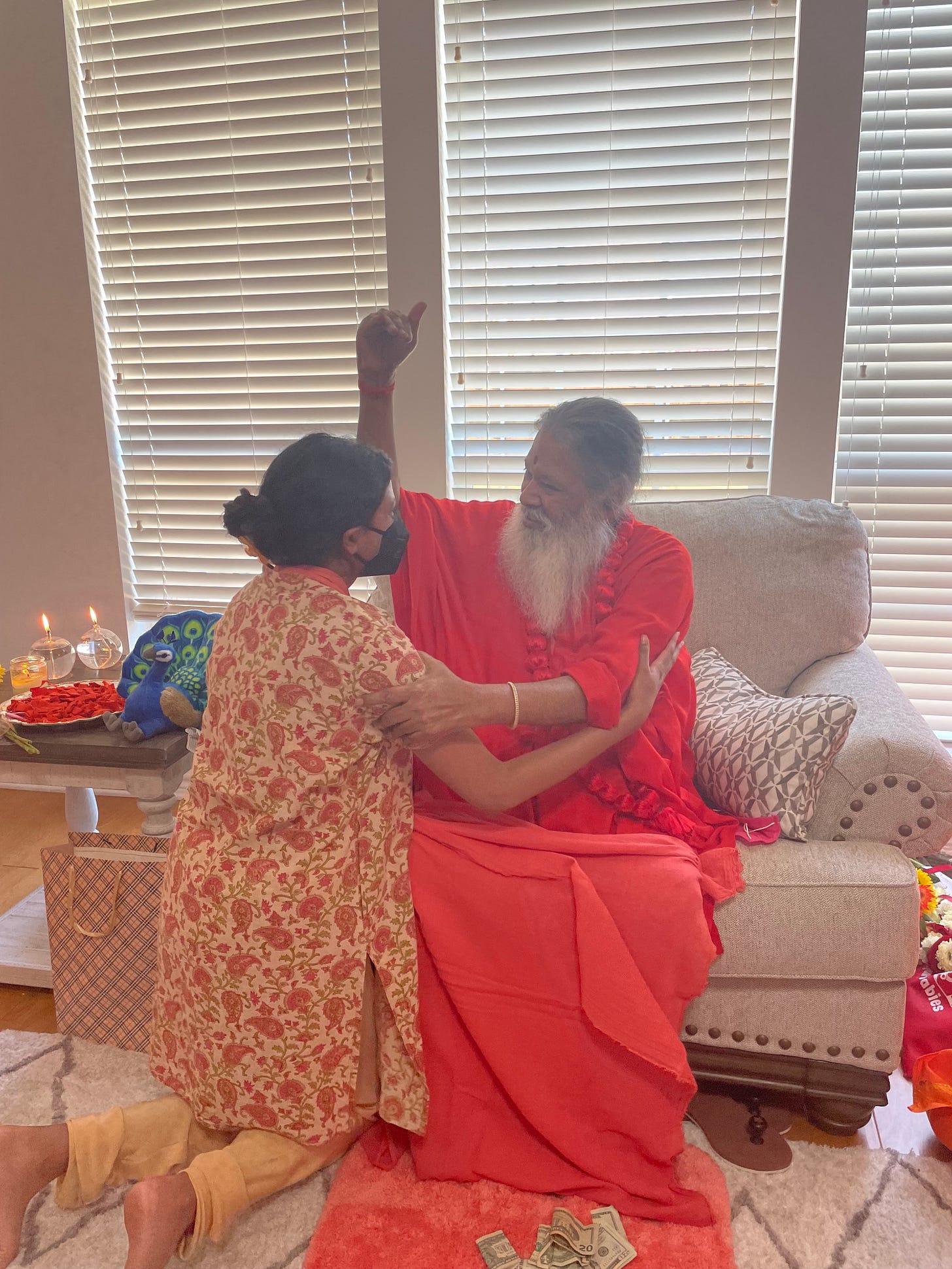So You Want to Chant the Entire Bhagavad Gita?
Why I'm Learning to Recite An Ancient Hindu Text
dhṛitarāśhtra uvācha
dharma-kṣhetre kuru-kṣhetre samavetā yuyutsavaḥ
māmakāḥ pāṇḍavāśhchaiva kimakurvata sañjaya
Dhritarashtra asked: O Sanjay, after gathering on the holy field of Kurukshetra, and desiring to fight, what did my sons and the sons of Pandu do?
Bhagavad Gita 1.1
Where does this begin?
The Bhagavad Gita begins with a question. It begins with om. It begins in the mouth of a king, who will not be the main character of this ancient, sacred text. What I mean to say is that beginnings are misleading.
My journey of chanting the Bhagavad Gita began in Dallas, Texas. It began in Frisco at the Karya Siddhi Hanuman temple, more specifically in the Guru Nilyam. In ashrams in India, I imagine that the Guru Nillyam, or the spiritual teacher’s house, is an ancient, wrought home. In America, it is a cookie cutter, white-walled suburban prototype. My mother, my brother, and I were granted an audience with our guru, Sri Ganapathy Sachidananda Swamiji. If you have never met a guru (and I don’t mean a white woman with crystals and a yoga live stream), it’s hard for me to find an analogy that could explain it. In my early memories of going to visit our guru, I thought of him like a grandfather, or maybe like Santa Claus; a man with a long beard and infectiously warm smile who playfully teased me and inspired awe. Kids call him Tataji, a loving word that means grandfather and connotes respect. As I grew older and found the need to explain my religiosity, I told people he was like a pastor or rabbi in that he conducted prayers and people came to him with their problems, but he was like the pope because his talks were live-streamed and hundreds of people traveled across the globe to see him. If I was talking to someone who believed in God, I told them what I had been told since I was a child: that Sri Swamiji was not just a spiritual teacher, but also divine himself. He is more than a man, as he is also God incarnate. Whether you believe it or not, it’s hard to deny the waves of energy that reverberate around him, hard to deny the rush of love you feel as hundreds of devotees gather before him. So when God incarnate/Santa Claus/Tataji walks into a carpeted room in a Texan suburb to speak just to you, you listen.
In that session, I understood very little. My guru, like my other elders, speaks Telugu while I only speak English. My mom translated most of what he told us. We sat in the air conditioning for an unknown amount of time, my brother and I reverting to our childhood selves as we watched our mom converse with divinity. By the end, we had our spiritual assignments. Mine was put simply: become a Bhagavad Gita reciter. After touching his feet, we were quickly ushered out into the harsh sun and that was that. It all happened so quickly, I didn’t think much about what I had been asked to do. I knew that hundreds of other people, including my aunt and Lakshmi aunty, had not only recited the Bhagavad Gita, but memorized it. My guru had hosted dozens of events where children as young as five and as old as 70 had chanted all 701 shlokas in the Bhagavad Gita. I knew it was not only possible, but at least somewhat common. If nose-picking first graders and my aunties who couldn’t work FaceTime could do it, then so could I. I was a 4.0 gpa English major. I did theater and choir in high school. Memorizing great works of literature seemed perfectly in my wheelhouse. Plus, I’d be taking a class with other Bhagavad Gita learners, most of whom were Americans like me with poor Indian language pronunciation skills. I began my journey with unearned confidence and sunny optimism.
Like I said, beginnings are misleading.
Three months into learning the Bhagavad Gita, I had fallen hopelessly behind my peers (the aforementioned first graders and aunties). In that time, most people in my classes had successfully had teachers approve their recitations of 7 chapters. I had only done 1. I missed half of the classes, some of that owing to my job schedule, but much of it owing to my own lack of discipline.
There have been many days where instead of feeling inner calm, I feel overwhelmed by the idea that I might fail at completing this. There are days when I question if what I am doing is worth it. And there are days when the act of reciting becomes invigorating. There are days when I realize what the Bhagavad Gita was trying to teach me all along, just by the act of doing it. There are days when I am consumed by its philosophy, its poetry, its troubling ethics, its ferocity, its connection to the seemingly disparate parts of my life.
In the Gita, Krishna (or Bhagavan as he is often named throughout the epic poem), tells Arjuna that his true divine form encompasses all parts of the universe, including time. He explains that Time has no end as it comes to consume all worlds and all people. For a divine being, the birth of a single human life does not constitute a beginning, as the soul in that body is eternal and will likely be born into another body if it does not reach enlightenment. What we think of as the beginning of one story is actually the middle of so many other stories, each with their own origins that are not actually origins at all.
There are things I omitted from my re-telling of the beginning. While chapter 1 of the Gita begins with om and a king’s question, my class actually starts our Bhagavad Gita with a song— the Dhyana shlokas. The melody gets stuck in my head all the time. In my version of this story, we began in a suburban home with my guru. I omitted the things my mother and guru said in Telugu, the way I watched my strong mother dissolve into tears. The way I saw her pent-up emotions dissolve into water droplets streaming down her cheeks. I leave out the original reason we got a private audience with my guru, and my brother’s assignment to choose a new name for himself, as he shed the one my guru originally gave him with for one that better suits his gender identity. I declined to tell you about the last two years of despondency and desolation I experienced. Those stories will have their time.
For now, we begin with a question.






Vahni your gift is your name which can also mean Gita or a song poetically speaking! I admire you for your ability to divine the essence of your experiences into words of song or Vahni the word for it in Sanskrit ♥️